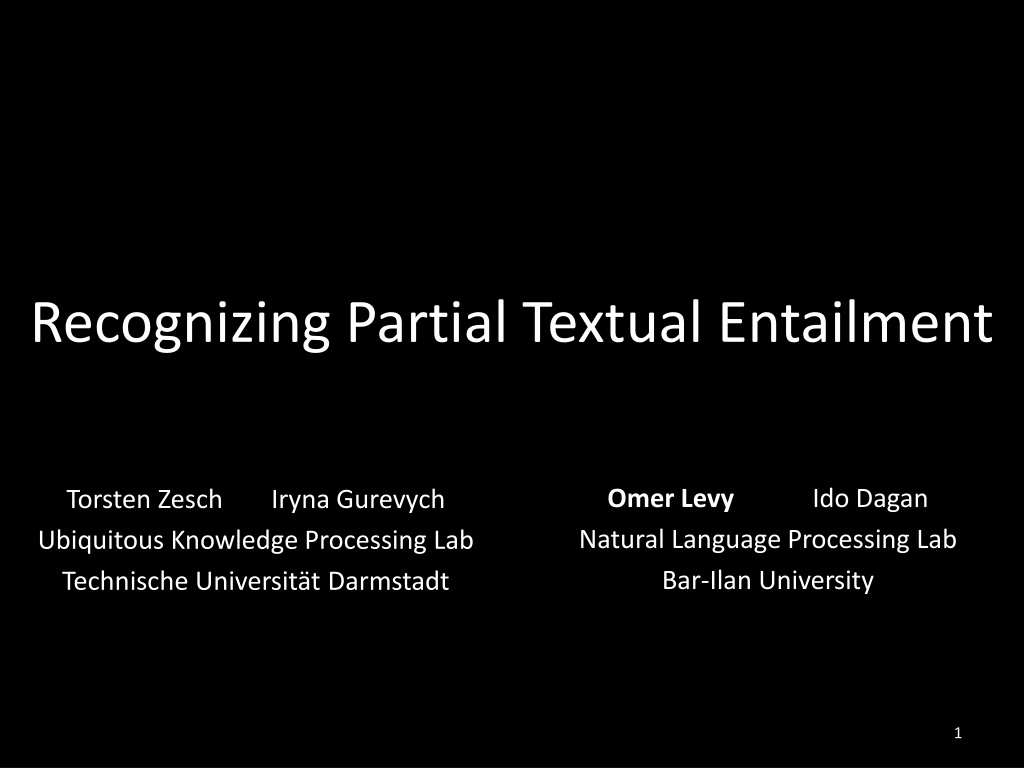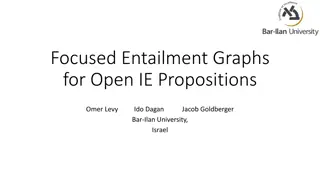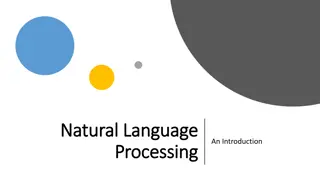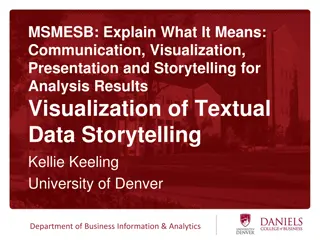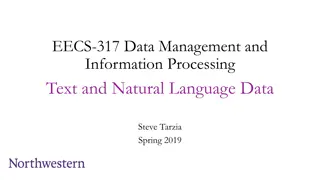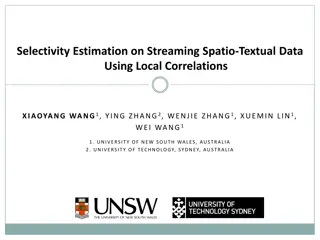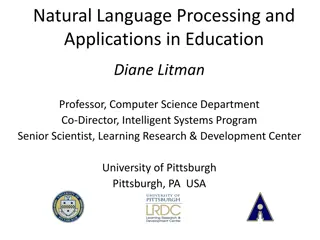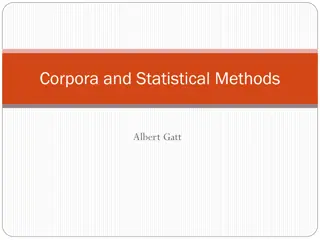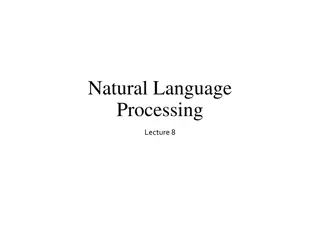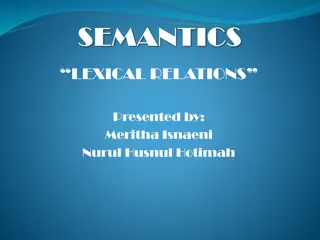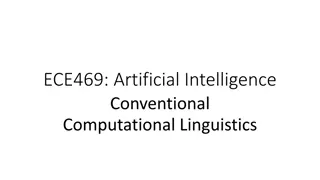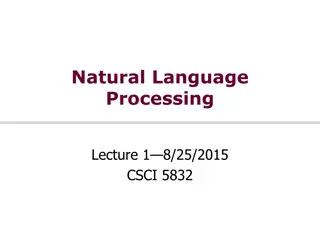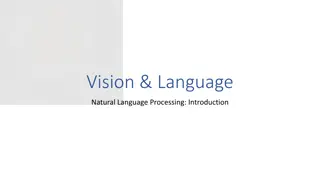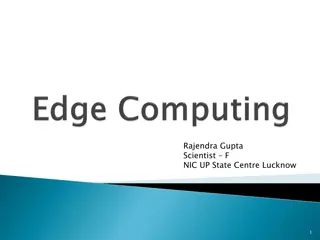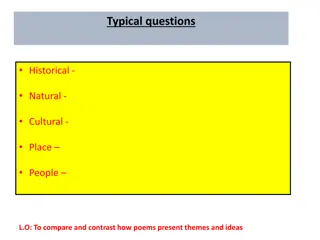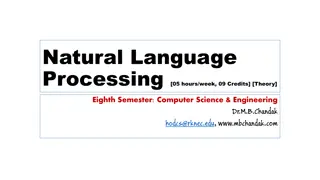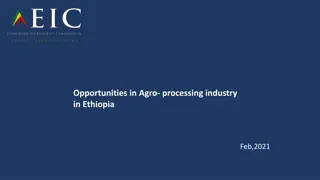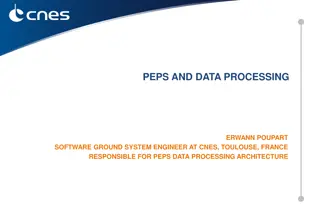Understanding Textual Entailment in Natural Language Processing
This collection of images showcases various aspects of textual entailment, where one text can entail another. It explores the relationship between statements like "muscles move bones" and "muscles generate movement". Different levels of entailment are depicted, culminating in complete textual entailment examples. The images depict scenarios where the statement "the muscles' main job is to move bones" can be fully or partially entailed by related statements.
Download Presentation

Please find below an Image/Link to download the presentation.
The content on the website is provided AS IS for your information and personal use only. It may not be sold, licensed, or shared on other websites without obtaining consent from the author. Download presentation by click this link. If you encounter any issues during the download, it is possible that the publisher has removed the file from their server.
E N D
Presentation Transcript
Recognizing Partial Textual Entailment Omer Levy Natural Language Processing Lab Bar-Ilan University Ido Dagan Torsten Zesch Ubiquitous Knowledge Processing Lab Technische Universit t Darmstadt Iryna Gurevych 1
T: muscles move bones H: muscles generate movement 4
T: muscles move bones H: muscles generate movement 5
T: muscles move bones ? H: the muscles main job is to move bones 6
T: muscles move bones H: the muscles main job is to move bones 7
Complete Textual Entailment . Partial . 10
Complete Textual Entailment . Partial . (Nielsen et al, 2009) 11
T: muscles move bones H: the muscles main job is to move bones 12
T: muscles move bones (main job of muscles) (muscles move) (bones are moved) H: the muscles main job is to move bones 13
T: muscles move bones (main job of muscles) (muscles move) (bones are moved) H: the muscles main job is to move bones 14
T: muscles move bones (main job of muscles) (muscles move) (bones are moved) H: the muscles main job is to move bones 15
T: muscles move bones (main job of muscles) (muscles move) (bones are moved) H: the muscles main job is to move bones 16
Facets T: muscles move bones (main job of muscles) (muscles move) (bones are moved) H: the muscles main job is to move bones 17
Facets T: muscles move bones (main job of muscles) (muscles move) (bones are moved) H: the muscles main job is to move bones (main job, muscles) (muscles, move) (move, bones) 18
Facets T: muscles move bones (main job of muscles) (muscles move) (bones are moved) H: the muscles main job is to move bones (main job, muscles) (muscles, move) (move, bones) 19
Facets T: muscles move bones (main job of muscles) (muscles move) (bones are moved) H: the muscles main job is to move bones (main job, muscles) (muscles, move) (move, bones) 20
Facet: a pair of terms and their implied semantic relation. 21
(move, bones) Facet: a pair of terms and their implied semantic relation. 22
(move, bones) Facet: a pair of terms and their implied semantic relation. theme is to move bones 23
Recognizing Faceted Entailment T: muscles move bones H: the muscles main job is to move bones 25
Recognizing Faceted Entailment T: muscles move bones H: the muscles main job is to move bones 26
Recognizing Faceted Entailment T: muscles move bones H: the muscles main job is to move bones 27
Recognizing Faceted Entailment T: muscles move bones H: the muscles main job is to move bones 28
Approach: Leverage Existing Methods Exact Match penicillin cures pneumonia (penicillin, cure) Lexical Inference (penicillin, cure) pneumonia is treated by penicillin Lexical-Syntactic Inference P: 96%, R: 30% 32
Approach: Leverage Existing Methods Exact Match penicillin cures pneumonia (penicillin, cure) Lexical Inference (penicillin, cure) pneumonia is treated by penicillin Lexical-Syntactic Inference P: 96%, R: 30% 33
Approach: Leverage Existing Methods Exact Match penicillin cures pneumonia (penicillin, cure) Lexical Inference pneumonia is treated by penicillin (penicillin, cure) Lexical-Syntactic Inference WordNet 34
Approach: Leverage Existing Methods Exact Match penicillin cures pneumonia (penicillin, cure) Lexical Inference pneumonia is treated by penicillin (penicillin, cure) Lexical-Syntactic Inference WordNet 35
Approach: Leverage Existing Methods Exact Match penicillin cures pneumonia (penicillin, cure) Lexical Inference pneumonia is treated by penicillin (penicillin, cure) Lexical-Syntactic Inference penicillin cures pneumonia pneumonia is treated by penicillin 36
Bar-Ilan University Textual Entailment Engine (Stern and Dagan, 2011) 37
BIUTEE 38
BIUTEE T H cures penicillin pneumonia 39
BIUTEE T H cures treated penicillin pneumonia pneumonia is by penicillin 40
BIUTEE T H cures treated penicillin pneumonia pneumonia is by penicillin 41
cures penicillin pneumonia 42
cures penicillin pneumonia cure treat (lexical) treats penicillin pneumonia 43
cures penicillin pneumonia cure treat (lexical) treats penicillin pneumonia active passive (syntactic) treated pneumonia is by penicillin 44
Facets to Dependencies treated pneumonia is by penicillin 45
Facets to Dependencies treated pneumonia is by penicillin 46
Decision Mechanisms Baseline Exact Match Exact Match OR Lexical Inference BaseLex BaseSyn Exact Match OR Syntactic Inference Lexical Inference Exact Match OR AND Syntactic Inference Majority 47
Decision Mechanisms Baseline Exact Match Exact Match OR Lexical Inference BaseLex BaseSyn Exact Match OR Syntactic Inference Lexical Inference Exact Match OR AND Syntactic Inference Majority 48
Decision Mechanisms Baseline Exact Match Exact Match OR WordNet BaseLex BaseSyn Exact Match OR BIUTEE Lexical Inference Exact Match OR AND Syntactic Inference Majority 49
Decision Mechanisms Baseline Exact Match Exact Match OR WordNet BaseLex BaseSyn Exact Match OR BIUTEE WordNet Exact Match OR AND BIUTEE Majority 50
